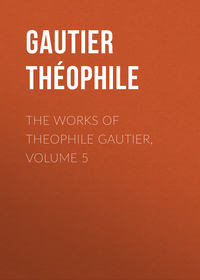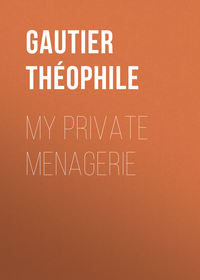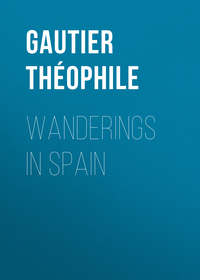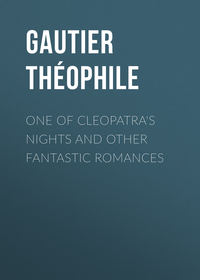Enamels and Cameos and other Poems
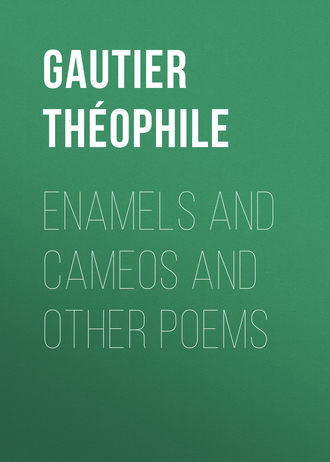 полная версия
полная версияEnamels and Cameos and other Poems
Жанр: зарубежная поэзиязарубежная классиказарубежная старинная литературастихи и поэзиясерьезное чтениеcтихи, поэзия
Язык: Английский
Год издания: 2017
Добавлена:
Настройки чтения
Размер шрифта
Высота строк
Поля
VETERANS OF THE OLD GUARD
(December 15)Driven by ennui from my room,I walked along the Boulevard.'Twas in December's mist and gloom.A bitter wind was blowing hard.And there I saw – strange thing to see! —In drizzle and in daylight drear,From out their dark abodes let free,Dim, spectral shadow-shapes appear.Yet 't is by night's uncanny hours,By pallid German moonbeams castOn old dilapidated towers,That ghosts are wont to wander past.It is by night's effulgent starIn dripping robes that elves intrigueTo bear beneath the nenupharTheir dancer dead of his fatigue.At night's mysterious tide hath beenThe great review – of ballad writs —Wherein the Emperor, dimly seen,Numbered the shades of Austerlitz.But phantoms near the Gymnase? — yea,And wet and miry phantoms, too,And close to the Variétés,And not a shroud to trick the view!With yellow teeth and stained dress,And mossy skull and pierced shoon,Paris – Montmartre – behold it press, —Death in the very light of noon!Ah, 't is a picture to be seen!Three veteran ghosts in uniformOf the Old Guard, and, spare and lean,Two ghost-hussars in daylight's storm.The lithograph, you would surmise,Wherein one ray shines down uponThe dead, that Raffet deifies,That pass and shout "Napoleon!"No dead are these, whom nightly drumMay rouse to battle fires that burn,But stragglers of the Old Guard, comeTo celebrate the grand return!Since fighting in the fight supreme,One has grown thin, another stout;The coats that fitted once now seemToo small, too loose, or draggled out.O epic rags! O tatters light,Starred with a cross! Heroic thingsOf ridicule, ye gleam more bright,More beautiful than robes of kings!Limp feathers fluttering adornThe tawny colbacks worn and grim.The bullet and the moth have tornAnd riddled well the dolmans dim.Their leathern breeches loosely hangIn furrows on their lank thigh-bones,Their rusty sabres drag and clang,As heavily they scrape the stones.Or some round belly firm and fat,Squeezed tight in tether labour-donned,Makes mirth and jest to chuckle at —Old hero quaint and cheveroned!But do not mock and jeer, my lad.Salute him, rather, and, believe,Achilles he, of IliadThat Homer's self could not conceive.Respect these men with battle signsThat twenty skies have painted brown;Their scars that lengthen out the linesOf wrinkles age has written down;Their skin whose colour deep and dun,Bared to the fronts of many foes,Tells us of Egypt's burning sun;Their locks that tell of Russia's snows.And if they shake, no longer strong?Ah! Beresina's wind was cold.And if they limp? The way was long,From Cairo unto Vilna told.If they be stiff? They'd but a flagFor sheet to hold their bodies warm.And if a sleeve be loose, poor rag?'T is that a bullet tore an arm.Mock not these veteran shapes bizarre,At whom the urchin laughs and gapes.They were the day, of which we areThe evening, and the night, perhaps, —Remembering if we forget —Red lancer, grenadier in blue,With faces to the Column set,As to their only altar true.There, proud of pain each scar denotes,And of long miseries gone by,They feel beneath their shabby coatsThe heart of France beat mightily.And so our smiles are steeped in tears,Seeing this holy carnival,This picture wan that reappears,Like morning after midnight's ball.And, cleaving heaven its own to claim,Wide the Grand Army's eagle spreadsIts golden wings, like glory's flame,Above their dear and hallowed heads.SEA-GLOOM
The sea-gulls restless gleam and glance,The mad white coursers cleave the lengthOf ocean as they rear and pranceAnd toss their manes in stormy strength.The day is ending. Raindrops chokeThe sunset furnaces. The gloomBrings the great steamboat spitting smoke,And beating down its long black plume.And I, more wan than heaven wide,For land of soot and fog am bound,For land of smoke and suicide —And right good weather have I found!How eagerly I now would pierceThe gulf that groweth wild and hoar!The vessel rocks. The waves are fierce.The salt wind freshens more and more.Ah! bitter is my soul's unrest.The very ocean sighing heavesIn pity its unhopeful breast,Like some good friend that knows and grieves.Let be – lost love's despair supreme!Let be – illusions fair that roseAnd fell from pedestals of dream!One leap! The dark wet ridges close.Away! ye sufferings gone by,That evermore returning brood,And press the wounds that sleeping lie,To make them weep afresh their blood.Away! regret, whose crimson heartHath seven swords. Yea, One, maybe,Doth know the anguish and the smart —Mother of Seven Sorrows, She!Each ghostly grief sinks down the vast,And struggles with the waves that throbTo close about it, and at lastDrown it forever with a sob.Soul's ballast, treasures of life's hand,Sink! and we'll wreck together down.Pale on the pillow of the sandI'll rest me well at evening brown.But, now, a woman, as I gaze,Sits in the bridge's darker nook,A woman, who doth sweetly raiseHer eyes to mine in one long look.'T is Sympathy with outstretched arms,Who smileth to me through the grayOf dusk with all her thousand charms.Hail, azure eyes! Green sea, away!The sea-gulls restless gleam and glance.The mad white coursers cleave the lengthOf Ocean as they rear and pranceAnd toss their manes in stormy strength.TO A ROSE-COLOURED GOWN
How I love you in the robesThat disrobe so well your charms!Your dear breasts, twin ivory globes,And your bare sweet pagan arms.Frail as frailest wing of bee,Fresher than the heart of rose,All the fabric delicate, free,Round your body gleams and glows,Till from skin to silken thread,Silver shivers lightly win,And the rosy gown have shedRoses on the creamy skin.Whence have you the mystic thing,Made of very flesh of you,Living mesh to mix and clingWith your glorious body's hue?Did you take it from the rudOf the dawn? From Venus' shell?From a breast-flower nigh to bud?From a rose about to swell?Doth the texture have its dyeFrom some blushing bashfulness?No – your portraits do not lie —Beauty beauty's form shall guess!Down you cast your garment fair,Art-dreamed, sweet Reality,Like Borghese's princess, rareFor Canova's mastery!Ah! the folds are lips of fireSweeping round your lovely formIn a folly of desire,With a weft of kisses warm!THE WORLD'S MALICIOUS
Ah, little one, the world's malicious!With mocking smiles thy beauty greeting.It says that in thy breast capriciousA watch, and not a heart, is beating.Yet like the sea thy breast is swellingWith all the wild, tumultuous powerA tide of blood sends pulsing, welling,Beneath thy flesh in life's young hour.Ah, little one, the world is spiteful!It says thy vivid eyes are fooling,And that they have their charm delightfulFrom faithful, diplomatic schooling.Yet on thy lashes' shifting curtainAn iridescent tear-drop trembles,Like dew unbidden and uncertain,That no well-water's gleam resembles.Ah, little one, the world reviles thee!It says thou hast no spirit's favour,That verse, which seemingly beguiles thee,Hath unto thee a Sanskrit savour.Yet to thy crimson lips inviting,Intelligence's bee of laughter,At every flash of wit alighting,Allures and gleams, and lingers after.Ah, little one, I know the trouble!Thou lovest me. The world, it guesses.Leave me, and hear its praises bubble: —"What heart, what spirit, she possesses!"INES DE LAS SIERRAS
TO PETRA CAMARAIn Spain, as Nodier's pen has told,Three officers in night's mid hoursCame on a castle dark and old,With sunken eaves and mouldering towers,A true Anne Radcliffe type it was,With ruined halls and crumbling roomsAnd windows graven by the clawsOf Goya's bats that ranged the glooms.Now while they feasted, gazed uponBy ancient portraits standing guardIn their ancestral frames, anonA sudden cry rang thitherward.Forth from a distant corridorThat many a moonbeam's pallid hueFretted fantastically o'er,A wondrous phantom sped in view.With bodice high and hair comb-tipped,A woman, running, dancing, hied.Adown the dappled gloom she dipped, —An iridescent form descried.A languid, dead, voluptuous moodFilled every act's abandon brief,Till at the door she stopped, and stoodSinister, lovely past belief.Her raiment crumpled in the tombShowed here and there a spangle's foil.At every start a faded bloomDropped petals in her hair's black coil.A dull scar crossed her bloodless throat,As of a knife. Like rattle chillOf teeth, her castanets she smoteFull in their faces awed and still.Ah, poor bacchante, sad of grace!So wild the sweetness of her spell,The curvèd lips in her white faceHad lured a saint from heaven to hell!Like darkling birds her eyelashesUpon her cheek lay fluttering light.Her kirtle's swinging cadencesDisplayed her limbs of lustrous white.She bowed amid a mist of gyres,And with her hand, as dancers may,Like flowers she gathered up desires,And grouped them in a bright bouquet.Was it a wraith or woman seen,A thing of dreams, or blood and flesh,The flame that burst from out the sheenOf beauty's undulating mesh?It was a phantom of the past,It was the Spain of olden keep,Who, at the sound of cheer at last,Upbounded from her icy sleep,In one bolero mad, supreme,Rough-resurrected, powerful,Showing beneath her kirtle's gleamThe ribbon wrested from the bull.About her throat the scar of redThe deathblow was, dealt silentlyUnto a generation deadBy every new-born century.I saw this self-same phantom fleet,All Paris ringing with her praise,When soft, diaphanous, mystic, sweet,La Petra Camara held its gaze, —Closing her eyes with languor rare,Impassive, passionate of art,And, like the murdered Ines fair,Dancing, a dagger in her heart.ODELET
AFTER ANACREONPoet of her face divine,Curb this over-zeal of thine!Doves wing frighted from the groundAt a step's too sudden sound,And her passion is a dove,Frighted by too bold a love.Mute as marble Hermes waitBy the blooming hawthorn-gate.Thou shalt see her wings expand,She shall flutter to thy hand.On thy forehead thou shalt knowSomething like a breath of snow,Or of pinions pure that beatIn a whirl of whiteness sweet.And the dove, grown venturesome,Shall upon thy shoulder come,And its rosy beak shall sipFrom the nectar of thy lip.SMOKE
Beneath yon tree sits humbleA squalid, hunchbacked house,With roof precipitous,And mossy walls that crumble.Bolted and barred the shanty.But from its must and mould,Like breath of lips in cold,Comes respiration scanty.A vapour upward welling,A slender, silver streak,To God bears tidings meekOf the soul in the little dwelling.APOLLONIA
Fair Apollonia, name august,Greek echo of the sacred vale,Great name whose harmonies robustThee as Apollo's sister hail!Struck with the plectrum on the lyre,And in melodious beauty sung,Brighter than love's and glory's fire,It resonant rings upon the tongue.At such a classic sound as this,The elves plunge down their German lake.Alone the Delphian worthy isSo lustreful a name to take, —Pythia! when in her flowing dressShe mounts her place with feet unshod,And, priestess white and prophetess,Wistful awaits the tardy god.THE BLIND MAN
A blind man walks without the gate,Wild-staring as an owl by day,Fumbling his flute betimes and late,Along the way.He pipeth, weary wretch and worn,A roundel shrill and obsolete.The spectre of a dog forlornAttends his feet.For him the days go lustreless.Invisible life with beat and roarHe heareth like a torrent pressAround, before.What strange chimeras haunt his headAnd on his mind's bedarkened space,What characters unheard, unread,Doth fancy trace?Thus down Venetian leads of doom,Wan prisoners ensepulchredIn palpable, undying gloomHave graven their word.And yet perchance when life's last sparkDeath speeds unto eternal night,The tomb-bred soul, within the dark,Shall see the light.SONG
In April earth is white and roseLike youth and love, now tenderingHer smiles, now fearful to discloseHer virgin heart unto the Spring.In June, a little pale and worn,And full at heart of vague desire,She hideth in the yellow corn,With sunburned Summer to respire.In August, wild Bacchante, sheHer bosom bares to Autumn shapes,And on the tiger-skin flung free,Draws forth the purple blood of grapes.And in December, shrivelled, old,Bepowdered white from foot to head,In dream she wakens Winter cold,That sleeps beside her in her bed.WINTER FANTASIES
IRed of nose and white of face,Bent his desk of ice before,Winter doth his theme retraceIn the season's quatuor, —Beating measure and the groundWith a frozen foot for us,Singing with uncertain soundOlden tunes and tremulous.And as Haendel's wig sublimeTrembling shook its powder, oftFlutter as he taps his timeSnow-flakes in a flurry soft.IIIn the Tuileries fount the swanMeets the ice, and all the trees,As in land of fairies wan,Arc bedecked with filigrees.Flowers of frost in vases lowStand unquickened and unstirred,And we trace upon the snowStarred footsteps of a bird.Where with lightest raiment spanned,Venus was with Phocion met,Now has Winter's hoary handClodion's "Chilly Maiden" set.IIIWomen pass in ermine dress,Sable, too, and miniver,And the shivering goddessesHaste to don the fashion's fur.Venus of the Brine comes forth,In her hooded mantle's fluff.Flora, blown by breezes North,Hides her fingers in her muff.And the shepherdesses roundOf Coustou and Coysevox,Finding scarves too light have woundFurs about their throats of snow.IVHeavy doth the North bedrapeParis mode from foot to top,As o'er fair Athenian shapeScythian should a bearskin drop.Over winter's garments meet,Everywhere we see the fur,Flung with Russian pomp, and sweetWith the fragrant vetiver.Pleasure's laughing glances feastFar amid the statues, whereFrom the bristles of a beastBursts a Venus torso fair!If you venture hitherward,With a tender veil to cheatGlances over-daring, guardWell your Andalusian feet!Snow shall fashion like a frameOn your foot's impression rare,Signing with each step your nameOn the carpet soft and vair.Thus were surly master ledTo the hidden trysting-place,Where his Psyche, faintly red,Were beheld in Love's embrace.THE BROOK
Near a great water's wasteA brook mid rock and sparCame bubbling up in haste,As though to travel far.It sang: "What joy to rise!'T was dismal under ground.I mirror now the skies.My banks with green abound."Forget-me-nots – how fair!Beseech me from the grass;Wings frolic in the air,And graze me as they pass."I yet shall be – who knows? —A river winding down,And greeting as it flowsValley and cliff and town."I'll broider with my sprayStone bridge and granite quay,And bear great ships awayUnto the long wide sea."So planned it, babbling by,As water boiling fastWithin a basin high,To top its brim at last.Cradle by tomb is crossed.Giants are early dead.Scarce born, the brook was lostWithin a lake's deep bed.TOMBS AND FUNERAL PYRES
No grim cadaver set its flawIn happy days of pagan art,And man, content with what he saw,Stripped not the veil from beauty's heart.No form once loved that buried lay,A hideous spectre to appal,Dropped bit by bit its flesh away,As one by one our garments fall;Or, when the days had drifted byAnd sundered shrank the vaulted stones,Showed naked to the daring eyeA motley heap of rattling bones.But, rescued from the funeral pyre,Life's ashen, light residuumLay soft, and, spent the cleansing fire,The urn held sweet the body's sum, —The sum of all that earth may claimOf the soul's butterfly, soul passed, —All that is left of spended flameUpon the tripod at the last.Between acanthus leaves and flowersIn the white marble gaily wentLoves and bacchantes all the hours,Dancing about the monument.At most, a little Genius wildTrampled a flame out in the gloom,And art's harmonious flowering smiledUpon the sadness of the tomb.The tomb was then a pleasant place.As bed of child that slumbereth,With many a fair and laughing graceThe joy of life surrounded death.Then death concealed its visage gaunt,Whose sockets deep, and sunken nose,And railing mouth our spirits haunt,Past any dream that horror shows.The monster in flesh raiment cladHid deep its spectral form uncouth,And virgin glances, beauty-glad,Sped frankly to the naked youth.Twas only at Trimalchio's boardA little skeleton made sign,An ivory plaything unabhorred,To bid the feasters to the wine.Gods, whom Art ever must avow,Ruled the marmoreal sky's demesne.Olympus yields to Calvary, now;Jupiter to the Nazarene!Voices are calling, "Pan is dead!"Dusk deepeneth within, without.On the black sheet of sorrow spread,The whitened skeleton gleams out.It glideth to the headstone bare,And signs it with a paraph wild,And hangs a wreath of bones to glareUpon the charnel death-defiled.It lifts the coffin-lid and quaffsThe musty air, and peers within,Displays a ring of ribs, and laughsForever with its awful grin.It urges unto Death's fleet danceThe Emperor, the Pope, the King,And makes the pallid steed to prance,And low the doughty warrior fling; —Behind the courtesan steals up,And makes wry faces in her glass;Drinks from the sick man's trembling cup;Delves in the miser's golden mass.Above the team it whirls the thong,With bone for goad to hurry it,Follows the plowman's way along,And guides the furrows to a pit.It comes, the uninvited guest,And lurks beneath the banquet chair,Unseen from the pale bride to wrestHer little silken garter fair.The number swells: the young give handUnto the old, and none may flee.The irresistible sarabandCompelleth all humanity.Forth speeds the tall, ungainly fright,Playing the rebeck, dancing mad,Against the dark a frame of white,As Holbein drew it – horror-sad; —Or if the times be frivolous,Trusses the shroud about its hips:Then like a Cupid mischievous,Across the ballet-room it skips,And unto carven tombs it flies,Where marchionesses rest demure,Weary of love, in exquisite guise,In chapels dim and pompadour.But hide thy hideous form at last,Worm-eaten actor! Long enoughIn death's wan melodrama cast,Thou'st played thy part without rebuff.Come back, come back, O ancient Art!And cover with thy marble's gleamThis Gothic skeleton! Each partConsume, ye flames of fire supreme!If man be then a creature madeIn God's own image, to aspire,When shattered must the image fade,Let the lone fragments feed the fire!Immortal form! Rise thou in flameAgain to beauty's fount of bloomLet not thy clay endure the shame,The degradation of the tomb!BJORN'S BANQUET
Bjorn, odd and lonely cenobite,High on a barren rock's plateau,Far out of time's and the world's sight,Dwells in a castle none may know.No modern thought may violateHis darkened and secluded hall.Bjorn bolts with care his postern-gate,And barricades his castle wall.When others wait the rising sun,He from his mouldering parapetStill contemplates the valley dun,Where he beheld the red sun set.Securely doth the past enlockHis retrospective spirit lone.The pendulum within his clockWas broken centuries agone.Waking the echoes wanders heBeneath his feudal arches drear,His ringing footsteps seeminglyFollowed by other footsteps clear.Nor priests nor friends with him make bold,Nor burghers plain nor gentlemen;But his ancestral portraits holdA parley with him now and then.And of a midnight, sparing himThe ennui of a lonely cup,Bjorn, harbouring a gloomy whim,Invites his ancestors to sup.Forth stepping at the hour's grim stroke,Come phantoms armed from foot to head.Bjorn, quaking, to the solemn folkProffers with state the goblet red.To seat itself each panoplyWith joints that grumble in revoltMaketh an angle with its knee,That creaketh like a rusty bolt;Till all at once the suit of mail,Rude coffin of an absent bulk,Cleaving the silence with a wail,Falls in its chair, a clanking hulk.Landgraves and burgraves, spare and stout,Come down from heaven or up from hell,The iron guests of many a bout,Arc bound within the midnight spell.Their blow-indented helmets bearHeraldic beasts that bay and grin,Athwart the shades the red lights glareOn crest and ancient lambrequin.Each empty, open casque now seemsLike to the helms of heraldries,Save for two strange and livid gleamsThat issue forth in threatening wise.Seated is each old combatantIn the vast hall, at Bjorn's behest,And the uncertain shadows grantA swarthy page to every guest.The liquors in the candle-shineTake on suspicious purples. AllThe viands in their gravy's wineGrow lurid and fantastical.Sometimes a breastplate glitters bright,A morion speeds its flashes wroth,A rondelle from a hand of mightDrops heavily upon the cloth.Heard are the softly flapping wingsOf unseen bats. The shimmer flicksUpon the carven panellingsThe banners of the heretics.The stiffly bended gauntlets playIn the dull glow incarnadine,And, creaking, to the helmets grayPour bumpers full of Rhenish wine;Or with their daggers keen of bladeCarve boars upon the plates of gold.The corridor's uncanny shadeHath clamours vague and manifold.The orgy waxes riotsome —One could not hear God's voice for it —For when a phantom sups from home,What wrong if he carouse a bit?Now every ghostly care they drownWith jokes and jeers and loud guffaws.A wine-cascade is running downEach rusty helmet's iron jaws.The full and rounded hauberks bulge,And to the neck the river mounts.Their eyes with liquid fire effulge.They're howling drunk, these valiant counts!One through the salad idly wieldsA foot; another scolds the sick.Some like the lions on their shieldsWith gaping mouths the fancy trick.In voice still hoarse from silence longIn the tomb's dampness and restraint,Max playfully intones a songOf thirteen hundred, crude and quaint.Albrecht, of quarrelsome repute,Stirs right and left a war intense,And drubs about with fist and foot,As once he drubbed the Saracens.And heated Fritz his helmet doffs,Not deeming he's a headless trunk.Then down pell-mell mid roars and scoffsTogether roll the phantoms drunk.Ah! 'T is a hideous battle-ground,Where pots and weapons bang and scud,Where every dead man through some woundDoth vomit victuals up for blood.And Bjorn observes them, sad of eye,And haggard, while athwart the panesThe dawn comes creeping stealthily,With blue, thin lights, and darkness wanes.The prostrate mass of rusty brownPales like a torch in daylight's room,Until the drunkest pours him downAt last the stirrup-cup of doom.The cock crows loud. And with the dayOnce more with haughty mien and bold,Their revel-weary heads they layUpon their marble pillows cold.THE WATCH
Now twice my watch have I taken,And twice as I've gazing sat,The hand has pointed unshakenTo one – and it's long past that!The clock's light cadences linger.The sun-dial laughs from the lawn,And points with a long, gaunt fingerThe path that its shade has drawn.A steeple ironicallyCalls the true time to me.The belfry bell makes tallyAnd taunts me with accents free.Ah, dead is the wretch! I sought not,Last night, to my reverie sold,Its ruby circle! I thought notOf glimmering key of gold!No longer I see with pleasureThe spring of the balance-wheelFlit hither and there at measure,Like a butterfly form of steel.When Hippogriff bears me, yearning,Through skies of another sphere,My soul-reft body goes turningWherever the steed may veer.Eternity still is givingIts gaze to the lifeless face.Time seeketh the heart once living,His ear at the old watch-case, —That heart whose regular motionWas followed within my breastBy wave-beats of life's full ocean!Ah well! the watch is at rest.But its brother is beating ever,Steadfast and sturdy keptBy One Who forgetteth never, —Who wound it the while I slept.THE MERMAIDS
There's a sketch you may discoverBy an artist of degreeRime and metre quarrel over —Théophile Kniatowski.On the snowy foam that fringesAll the mantle of the brine,Radiant with the sunlight's tinges,Three mermaidens softly shine.Like the drownèd lilies dancingTurn they, as the spiral waveBuoys their bodies hiding, glancing,As they sink and rise and lave.In their golden hair for dowersThey have twined with beauteous handsShells for diadems, and flowersFrom the deep wild under sands.Oysters pour a pearly hoardingTheir enrapturing throats to gem,And the wave, its wealth according,Tosses other pearls to them.Borne above the crest of oceanBy a Triton hand and strong,Twine they, beautiful of motion,Under gleaming tresses long.And the crystal water under,Down the blue the glories paleOf each lovely form of wonder,Tapered to a shimmering tail.Ah! But who the scaly swimmersWould behold in modern day —When a bust of ivory glimmers,Cool from kisses of the spray?Look! Oh, mingled truth and fable!O'er the horizon steady plied,Comes a vessel proud and stable,Toward the mermaids terrified!Tricoloured its flag is flaunted,And it vomits vapour red,And it beats the billows daunted,Till the nymphs dive low for dread.Fearlessly they did beleaguerTriremes immemorial,And the dolphins arched and eagerWaited for Arion's call.This of old. But now the steamer —Vulcan hurtling Venus' charms, —Would destroy the siren gleamer,With her fair, nude tail and arms.Farewell myth! The boat that passesThinks to see on silver bar,Where the widening billow glasses,Porpoises that plunge afar.



